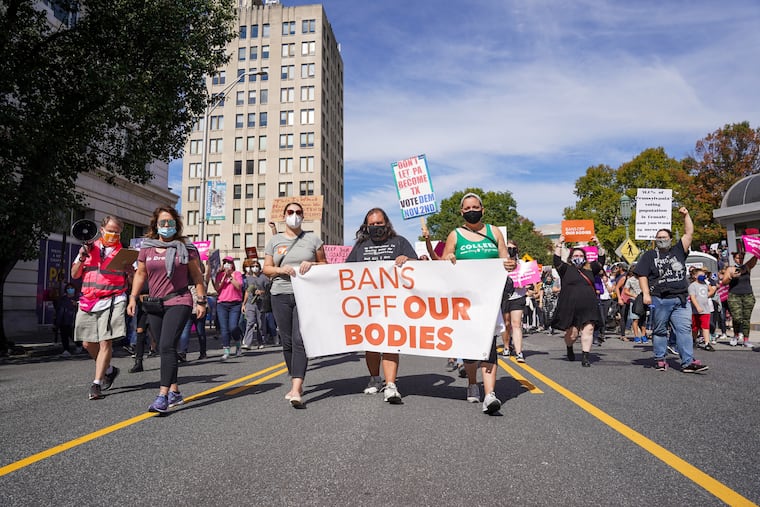How Pa. can protect abortion rights no matter what the Supreme Court decides | Editorial
As the justices weigh a Mississippi case and the possible erosion of Roe v. Wade, the outcome of two statewide political races in 2022 may ultimately shape abortion rights in the commonwealth.

The future of abortion in Pennsylvania is going to be decided in 2022 — not only by nine U.S. Supreme Court justices but by millions of voters across the commonwealth.
For years, there have been concerns that the conservative majority on the highest court in the land would eventually lead to the erosion of abortion rights. This week, those fears seemed to have proven prescient.
On Wednesday, the Supreme Court heard oral arguments in Dobbs v. Jackson Women’s Health Organization — a case that challenges the core tenets of abortion jurisprudence in the United States. For nearly half a century, since the landmark decision in Roe v. Wade in 1973, pregnant people have had a right to terminate a pregnancy. States can’t ban the medical procedure before 24 weeks of pregnancy.
Things changed in 2016. The death of Justice Antonin Scalia left a vacancy on the court that a Republican-controlled Senate refused to allow President Barack Obama to fill. Also that year, Republican presidential nominee Donald Trump promised voters that if he gets to put “two or perhaps three justices on” the Supreme Court, overturning Roe “will happen automatically.”
» READ MORE: How the Mississippi Supreme Court case could impact abortion access in Pa. and N.J.
Trump got his three justices — conservatives, none older than 53, and all freshly minted by the Federalist Society. Now it was just a matter of the right case coming before the court.
So when Mississippi enacted an abortion ban after 15 weeks of pregnancy, the state’s Republican lawmakers knew exactly what they were doing: They crafted a direct challenge to Roe, giving the newly 6-3 conservative court the opportunity to abolish it.
The conservative justices didn’t hide their contempt for abortion during the hearing. Justice Clarence Thomas asked “what constitutional right protects the right to abortion,” a question that seemed to disregard nearly 50 years of precedent. Justice Samuel Alito compared reversing Roe to reversing Plessy v. Ferguson — the case that allowed for legal racial segregation. Justice Amy Coney Barrett argued that laws that facilitate adoption “take care of” the harm that abortion intends to address.
Precedent be damned — supporters of the conservative majority got the case they wished for, and America is left waiting until the court’s ruling is issued next summer to see the extent to which pregnant people will still be able to control their own bodies.
Reversing Roe leaves abortion rights in the hands of state lawmakers. It all but guarantees a ban will be pushed in Pennsylvania. Republicans have tried that already. In 2017, Gov. Tom Wolf vetoed a ban that would have restricted procedures after 20 weeks of pregnancy. Every legislative session, Republicans introduce a six-week ban. Last month, in response to a lawsuit challenging Pennsylvania’s prohibition on Medicaid coverage of abortion, Republicans proposed an amendment to the state constitution “clarifying that there is no right to an abortion or abortion funding.”
» READ MORE: The next steps to protect abortion in Pennsylvania | Editorial
Despite all this, there are ways to defend the crucial right to an abortion in the commonwealth — a right that has saved lives, promoted gender and economic equity, and advances liberty.
Congress can enact a law enshrining a right to an abortion. A law doing exactly that, the Women’s Health Protection Act, passed the House of Representatives this fall. Pennsylvania Sen. Bob Casey is one of two Democrats who didn’t express support for the bill. Without filibuster reform, the abortion-rights bill won’t pass the Senate, but that doesn’t mean that Casey should be let off the hook.
“Senator Casey will be reviewing the briefs and the arguments in Dobbs v. Jackson as he continues to consider the Women’s Health Protection Act,” his office told this board Thursday, adding that a Senate vote hasn’t been scheduled yet.
In 2022, Pennsylvania will elect a senator to replace retiring Republican Pat Toomey. Ensuring that the seat gets filled by a supporter of abortion rights would be critical in a post-Roe America.
Also in 2022, Pennsylvania will elect a governor to replace Wolf, who is finishing his second term. The governor’s pen has kept Pennsylvania from enacting abortion bans more than once, and it’s essential that his successor is also willing to safeguard the rights of pregnant people.
Nine justices in black robes don’t get to have the final say on abortion rights in Pennsylvania. A reversal of Roe would be a calamity for the nation. In Pennsylvania, it wouldn’t be the end of the fight.